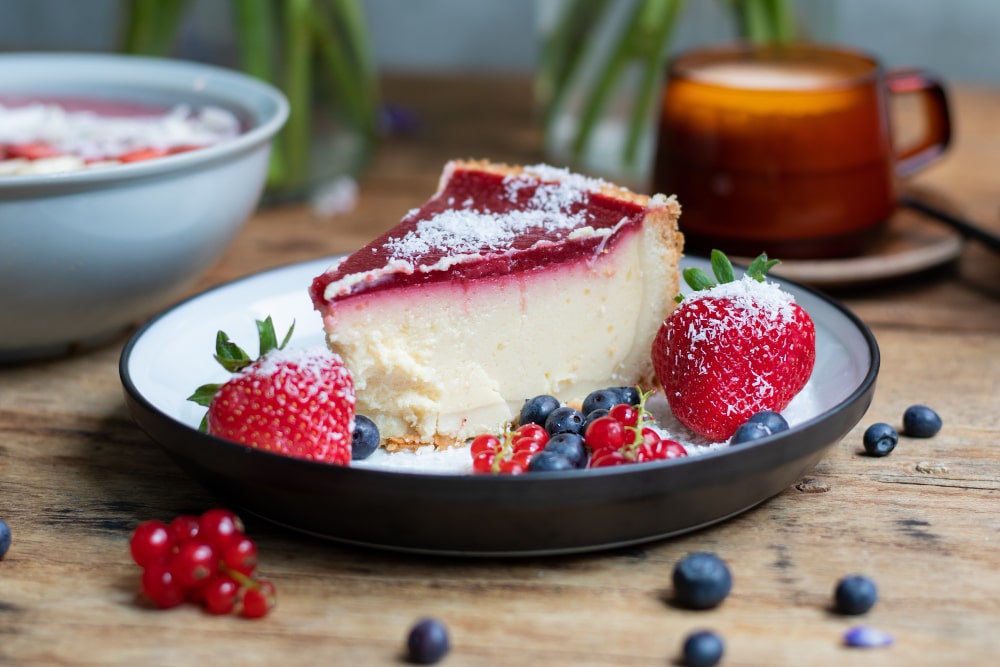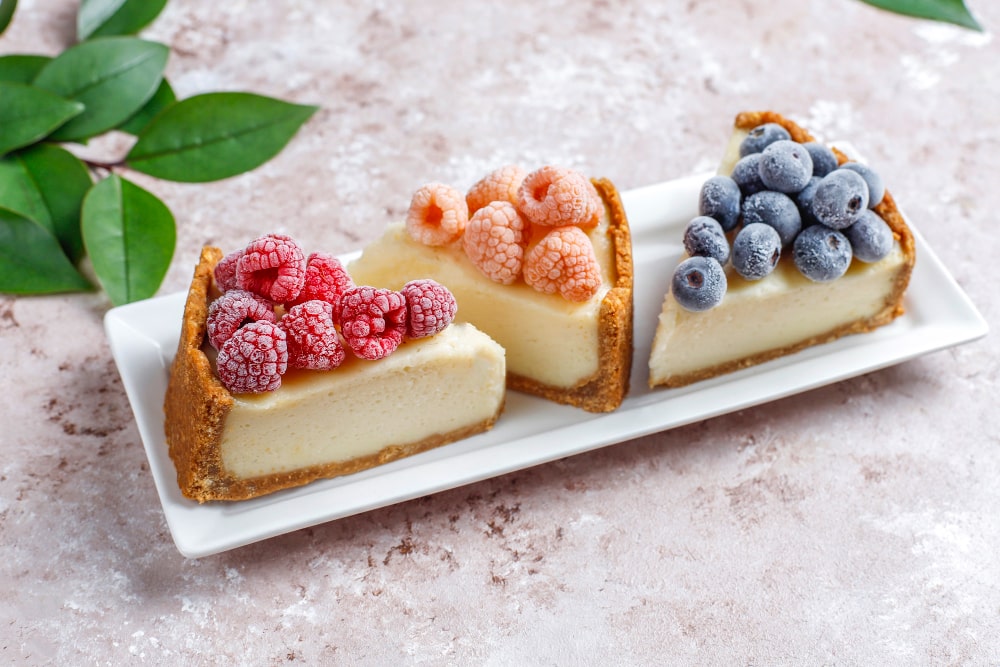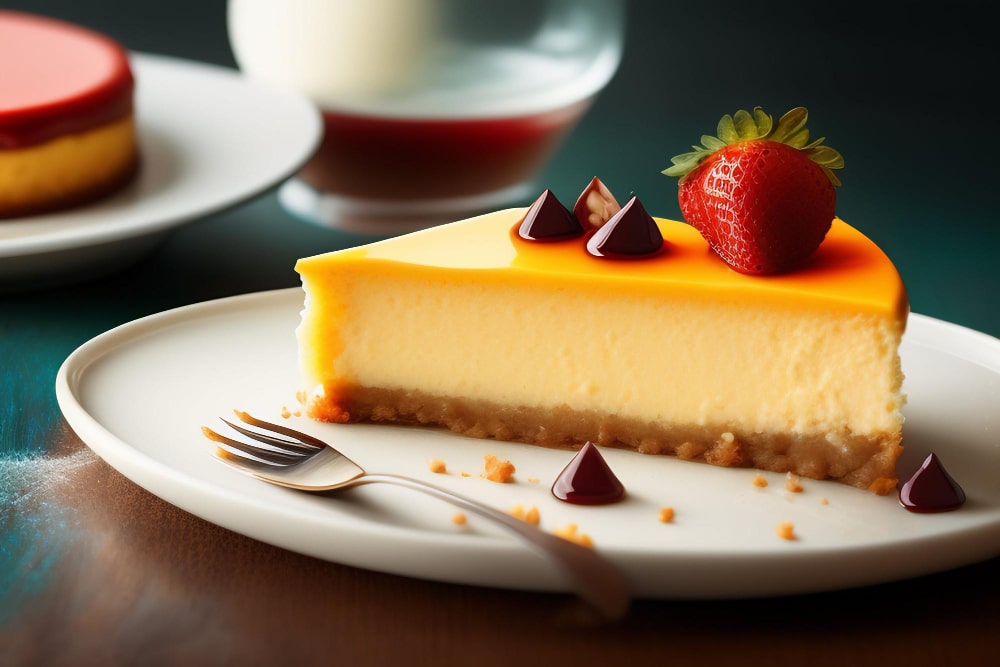As you prepare to welcome a new addition to your family, it’s only natural for you to worry about everything involved in caring for a baby. Among the many questions during pregnancy is whether or not indulging cravings and treats is safe—including one of the classics: cheesecake! If you’ve been wondering if pregnant women can eat cheesecake, here are the facts to help you make an informed decision. In this article, we discuss the nutritional value of cheesecake and review the risks associated with to eat cheesecake while pregnant. We also provide tips for making safe cheesecake choices and explore alternative options for those who want something sweet without the potential drawbacks of consuming traditional cheesecakes.
Nutritional Value of Cheesecake
Cheesecake is a delicious dessert made of a graham cracker or cookie crust, cream cheese, eggs, sugar, and sometimes other ingredients such as fruit. This combination of ingredients makes cheesecake quite calorie dense, containing around 300 calories per slice. While this may not seem like much in the grand scheme of things, many women find themselves watching what they eat while pregnant. Cheesecake also contains some essential vitamins and minerals that can be beneficial for pregnant women, including calcium, Vitamin A, and B12.
Read More: The 5 Best Teas for Headaches to Relief Pain Naturally
Benefits of Eating Cheesecake While Pregnant:
To eat cheesecake while pregnant can provide a variety of health benefits. It’s important to remember that the key is moderation – if you eat it in small amounts, there are several potential advantages, including:
1. Improved Bone Health: To eat cheesecake while pregnant will help provide your body with calcium, essential for building strong bones and teeth in both you and your baby.
2. Increased Energy: Some ingredients in cheesecake provide energy, which can be beneficial if you feel fatigued or drained during any point in your pregnancy.
3. Stress Relief: Eating a treat like cheesecake can help boost your mood and reduce stress levels, thus positively impacting both you and your baby.
4. Increased Vitamin A Intake: The cream cheese used to make cheesecake contains a decent amount of Vitamin A, which is important for healthy vision, skin health, and cell growth.
5. Folate Content: Cheesecake also contains folate, which is important for fetal development and can help prevent birth defects in pregnant women.
6. Improved Mood: Enjoying a slice of cheesecake occasionally can help improve your mood since it’s an indulgent treat that can give you a boost of energy when needed.
Read More: 5 Healthy Noodles Recipes in (2023): Benefits, How to Cook?
Is it Safe to Eat Cheesecake While Pregnant?
When it comes to eat cheesecake while pregnant, the primary concern is the safety of the ingredients. Most store-bought cheesecakes will contain pasteurized ingredients that are safe for pregnant women. However, if you’re making cheesecake at home from scratch, you should ensure that all ingredients are pasteurized and safe for consumption while pregnant. Additionally, raw eggs should always avoid when eating cheesecake as they can increase your chances of getting ill from foodborne illnesses such as salmonella.
Another important factor in determining whether or not it is safe to eat cheesecake while pregnant is proper handling and storage practices. Cheesecake should be stored in a cool, dry place (ideally below 40°F) and consumed within two days of purchase. It is also important to be aware that cheesecake should not be left out at room temperature for more than two hours, as this can increase the risk of foodborne illnesses.


Read More: How to Make Ginger Juice at Home: Health Benefits, FAQs
Risks Associated with Eating Cheesecake While Pregnant:
1) Excessive Weight Gain:
Eat cheesecake while pregnant may lead to weight gain, which can pose a risk for both mother and child. Many pregnant women already struggle with excessive weight gain due to the hormonal changes accompanying pregnancy. Eating high-calorie foods like cheesecake can exacerbate this issue, making it important to watch portions when indulging in this dessert.
2) Blood Sugar Control:
Another potential risk associated with eating too much cheesecake while pregnant is an increased risk of gestational diabetes or impaired blood sugar control. Since cheesecakes are made from sugary ingredients such as cream cheese and eggs, they can cause a spike in your blood sugar levels if eaten in excess. It is, therefore, important to monitor your sugar levels regularly if you eat cheesecake while pregnant.
3) Digestive Discomfort:
Eating too much of anything can cause digestive discomfort, and this is especially true for pregnant women. Cheesecakes contain high amounts of fat and dairy, which can be difficult to digest when eaten in excess. Therefore, paying attention to how much you consume when indulging in this dessert is important.
4) Allergies and Food Sensitivities:
Cheesecakes typically contain various ingredients, including dairy products, eggs, flour, nuts, and more. Depending on the specific recipe, these ingredients may trigger an allergic or food sensitivity reaction in some people. It is, therefore, important that pregnant women carefully check ingredient labels before indulging in cheesecake.
5) Foodborne Illnesses:
As previously mentioned, raw eggs should always avoid when eating cheesecake as they can increase your chances of getting ill from foodborne illnesses such as salmonella. It is also important to ensure that all ingredients are pasteurized and stored properly to reduce the risk of foodborne illnesses.
Read More: Best Soft Foods to Eat After Oral Surgery in (2023)
Alternative Options for Cheesecake Lovers:
- Fruit Parfaits: Fruit parfaits are a great alternative to traditional cheesecake and still provide the creamy texture you want: layer yogurt, granola, and favorite fruits to create an indulgent yet healthy treat. You can also use low-fat or non-fat Greek yogurt if you’re trying to keep your calorie intake down.
- Greek Yogurt Cheesecake: This delicious recipe combines Greek yogurt with cream cheese for a lighter version of classic cheesecake. Enjoy this alone, or add fresh fruit for added flavor and nutrients! Plus, it’s much lower in calories than traditional cheesecake, so you don’t have to worry about overindulging.
- Mini Cheesecake Bites: These mini cheesecakes are a great way to satisfy your craving without eating an entire cake slice. You can make them with Greek yogurt or low-fat cream cheese and top them with your favorite fresh fruit for added flavor and nutrition. Plus, they’re the perfect size for snacking!


Read More: 6 Favorite High Calorie Vegan Foods, Health Benefits, FAQs
Tips for Making Safe Cheesecake Choices:
When it comes to eat cheesecake while pregnant, here are a few tips to keep in mind:
- Always check ingredient labels for any potential allergens or sensitivities
- Make sure all ingredients are pasteurized and safe for consumption during pregnancy
- Avoid raw eggs at all costs
- Choose lighter versions of traditional recipes with non-fat cream cheese or egg whites
- Monitor portion sizes to avoid excessive weight gain
- Be aware of any foodborne illness risks that come with improper storage and handling
Conclusion
Ultimately, when it comes to eat cheesecake while pregnant, it is important to be aware of the potential risks and take steps to ensure that all ingredients are safe for consumption. Eating a slice or two of store-bought cheesecake may not pose any significant risks, but it is still important to monitor portion sizes to avoid excessive weight gain. Additionally, there are plenty of healthier alternatives that can help satisfy cravings without compromising safety. With proper precautions and mindful indulgence, you can enjoy a slice of your favorite dessert without worry!
Read More: 6 Best Comfortable Foods to Eat After Wisdom Teeth Removal in (2023)
FAQs
A: In moderation, yes. Cheesecake can be a part of a healthy pregnancy diet when consumed in moderation and without added sugar. However, it is important to note that many store-bought cheesecakes are high in calories and fat, so they should eat in limited amounts. Additionally, it is important to make sure the ingredients used for homemade cheesecakes are fresh and safe for pregnant women.
A: The Centers for Disease Control (CDC) recommends avoiding eating foods made with raw or partially cooked eggs as there is a risk of Salmonella contamination during pregnancy. It is best to avoid either eating foods with raw eggs or making sure that they are cooked thoroughly.
A: Store-bought cheesecakes can be high in calories and fat, so it is important to read the label before consuming them. Additionally, many store-bought products contain added ingredients such as sugar, which should also avoid during pregnancy.
A: Yes! There are many healthy and delicious alternatives to traditional cheesecake that pregnant women can safely enjoy. Some options include yogurt parfaits, chia seed pudding, and no-bake fruit tarts. Additionally, many recipes are available online for healthier versions of traditional cheesecakes without added sugar or unhealthy ingredients.
A: Generally speaking, it is safe to consume frozen cheesecake while pregnant as long as it is made with pasteurized eggs and does not contain any added sugar or unhealthy ingredients. However, due to its high-calorie content, it should consume in moderation.

